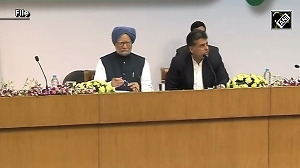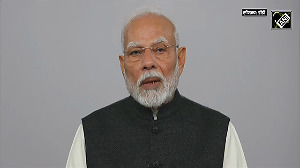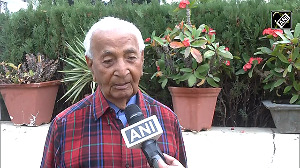"In order to proceed further (in the probe into the Mumbai attacks), we will send more queries to India in this regard," Pakistan Interior Minister Rehman Malik told mediapersons outside Parliament.
The Pakistan government is ready to extend "unconditional cooperation" to India to investigate the Mumbai attacks, he said.
"However, India would have to reciprocate our efforts by adopting a positive stance," he said.
India initially provided the confessional statement of Ajmal Amir Kasab, the lone Pakistani terrorist captured during the attacks, in Marathi and this held up the probe, Malik said.
The translated version of the statement was subsequently provided by New Delhi and authorities are examining it.
Meanwhile, 'Dawn' newspaper quoted its sources in the Interior Ministry as claiming that last year's Mumbai attacks and the 2007 bombing of the Samjhauta Express train were linked. This was one of the reasons why Pakistan would send another dossier to India seeking more information about the Mumbai attacks, the sources claimed.
Malik too referred to the apparent link between the two attacks during an interaction with mediapersons on Monday.
"We believe that there is a link between the two incidents because investigations conducted by some foreign agencies also hint the same," Malik said.
He had then described the information provided by India as insufficient and said it could not be used to take action against the alleged perpetrators of the Mumbai attacks.
Malik also said Pakistan had arrested five of the accused and declared 13 others as proclaimed offenders. Eleven handlers who helped terrorists plan the attacks had been identified, he said.
The five Lashker-e-Tayiba operatives arrested by Pakistan -- Zakiur Rehman Lakhvi, Zarar Shah, Hamad Amin Sadiq, Abu al Qama and Shahid Jamil Riaz -- are currently facing trial in an anti-terror court in Rawalpindi, but there has been little progress in the case as the judge hearing it was removed from his position in May as part of judicial reforms.
A new judge has not yet been appointed to hear the case, which has been adjourned several times without any proceedings.
India has also expressed concern over the release from detention of banned Jamaat-ud-Dawah chief Hafiz Mohammad Saeed on the orders of the Lahore High Court.
Saeed, also the founder of LeT, was detained soon after the Mumbai attacks.






 © 2024 Rediff.com -
© 2024 Rediff.com -